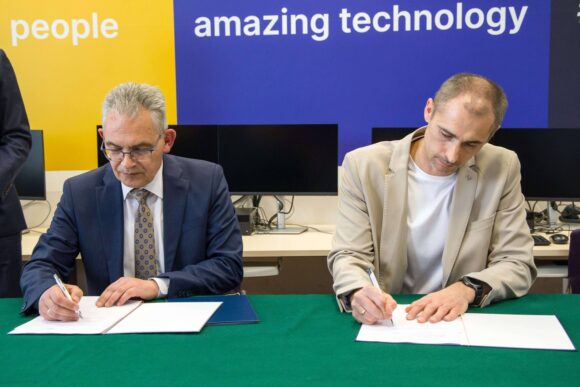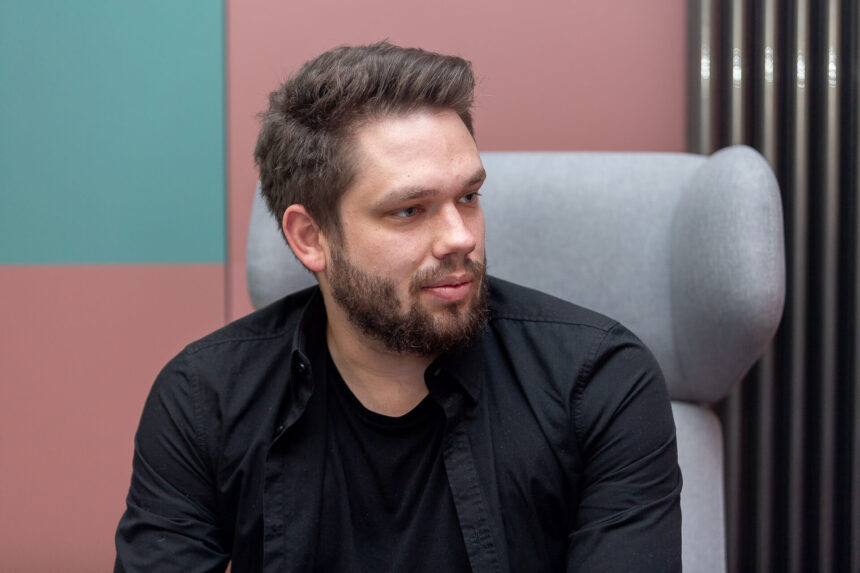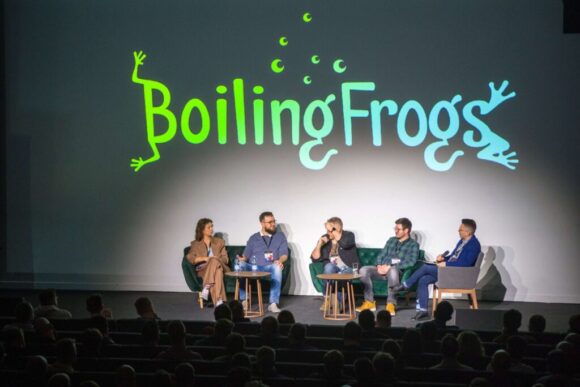
How do we implement new technologies? An interview with our developer, Marcel

Our engineers use dozens of tools and technologies. Depending on the product, they use different programming languages. They learn about database scripts, create automatic tests, and operate in a cloud environment. Do you need to know all of this when you come to Metapack? Read an interview with Marcel, who has already gone through three of our products in three years and is the first one to develop the last of them. In a short interview, he reveals what the process of implementing developers in new technologies looks like and how our organizational culture helps in this.
Marcel, you’ve been with us for 3 years, but let’s start from the beginning. Did you always know you wanted to be a developer? 😉
I understood it quite early, still in technical secondary school, when computer science appeared in the first grade. It was then that I had my first contact with programming. As part of my professional qualifications, I was given the task of creating a broadly understood internet application. I worked on it in JavaScript and PHP, there was also some communication with the base, i.e. SQL scripts. I got it all quite quickly and I liked the classes. We had a demanding teacher, but it made it easier later at the university.
Where you also chose computer science…
Yes, my studies helped me to learn JavaScript, I also learned a new programming language – C #, which I had already dealt with in Metapack. I was also working on my own projects and the moment came when I felt it was time to use my knowledge in practice, in my professional work. I was in my third year of university at the time and I submitted my CV to Metapack.
Read also: How to choose a position to suit your own competencies? An interview with Tomek
Interestingly, at the same time we were carrying out a group project during my studies and this subject was conducted in cooperation with Metapack at my specialization. We had a supervisor from the company who managed the project, helped in the substantive part, and suggested how to perform certain tasks. At the same time, recruitment for the position for which I applied was ongoing. I think this collaboration in college played a role in the recruitment process because it gave the company an insight into how I work.
We did have the opportunity to test you at the CV verification stage. Has this changed the standard recruitment process for you? Did you go through the stages differently than your colleagues?
No, the recruitment process was the same as for everyone. I applied to Metapack in 2019, before the pandemic, so the stages were a bit different then. Of course, I was given a task and I had a week to create an application. My assignment was assessed, I received feedback on what I did well, what should be improved and some tips on how to work on similar assignments. However, the recruiters liked the application and thanks to that I moved to the next stage. It was a conversation, more technical, with one of the leaders in the development department. After this conversation, I was invited to the last stage, i.e. a meeting with my colleagues from the team I was about to join. We talked about how I like to work, we got to know each other and we exchanged experiences.
By coming to Metapack you joined the team working on our Polish product. You already knew JavaScript, C#, databases. What technologies did you learn as a developer and was exploring them a problem for you?
While working on the product to which I was assigned, I had to get to know Jenkins, AWS, Team City, because we worked mainly on these tools. It wasn’t, however, that I was thrown into deep water and had to use them immediately, even though I had not dealt with them yet. On the contrary, I got to know them all step by step. In the first year, I worked mainly on C#, which I already knew, and at the same time I was learning Team City. After a year, the integration between our Polish and British systems started. That’s when Jenkins and Docker showed up. I learned all of this while completing the tasks, which was a very nice experience and still is, because there are new challenges and new products all the time. For example, we are now focusing primarily on the American product, and we use different technologies to develop it – those that I already know and those that are new.
When new technology emerged, did you receive direct help from your senior colleagues?
Yes, I felt the support of my colleagues all the time. We have a very strong culture when it comes to sharing knowledge. We also have a lot of instructions written by other colleagues, they contain answers to the most frequently asked questions, the simplest processes thanks to which we know how to recreate something ourselves. But when these instructions were insufficient, I asked questions and always received help.
You said you worked on a Polish product, British, then American. Did learning new technologies result from working on particular systems to which you were assigned? What programming languages have you been dealing with while working on each of them?
In the Polish product, as I said, I mainly used the C# language. Another one, Groovy, came with the British system. At the same time, there was a lot of emphasis on database scripts. We also worked on Java, but more in terms of testing and creating automated tests. For a year, we have also been using TypeScript and it is actually assigned to the American product that we are currently developing. We created the first module in JS, but together we decided to develop the next ones in TypeScript.
You have already mentioned that while learning about a new technology or tool, you had at your disposal instructions and documentation prepared by colleagues. Please give us a closer look at this knowledge-building process for developers in Metapack.
When I started working on an American product, I was assigned to a new team dedicated to this system. So I was one of the first developers to work on it, and apart from working on the product itself, my team and I also had the task of creating a process that would allow other programmers to quickly implement the technologies we use. You can say that we set the paths for posterity (laughs).
Read also: Internal recruitment in Metapack. From customer service to coding – Magda’s story
How do we do it? In addition to the numerous instructions that we create as the work progresses, we also designed the so-called adaptive module. It is an invented module that will allow new employees to learn how to use specific technologies, and how to write code for our specific product. Everyone goes through such an adaptation module before receiving any business tasks and I also learned on a similar module, starting work on our Polish system. My teammate and I decided that it would be a very good idea to create such an implementation process not only for new employees but also for developers who are already in Metapack. To make sure that this process is not reserved only for onboarding, that other developers can also implement the product in this way.
It is also a nice experience that after such a short time of work I was able to take on this project. I am not only a programmer who works on a product, but also a person who helps others get into work.
From your perspective, three years of work is short, but from what you say, a lot has happened during this time. It was quite an intense time for you in terms of work.
Definitely. When I came to the company, after the first year, I had the feeling that I had learned a lot. I realized how little I knew at the very beginning. After each subsequent year, this impression is the same and at this stage, I am curious about what will happen in the next few years. What else will this work surprise me with and what awaits me.
Now there is an emphasis on AWS, AWS Lambdas, and Terraforms, so the development goes not towards Software Engineer, but more Dev-Ops. Development is possible all the time, all the time. What I am particularly happy about is the fact that we can learn during work what we would like to get to know privately, because most of the technologies I deal with now also interested me in my private projects. This is so cool.
